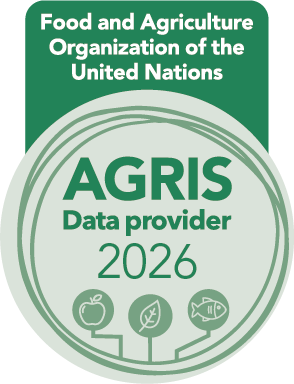Caracterización agroecológica del sistema productivo de Sacha Inchi (Plukenetia volubilis Linneo) en Arauquita, Colombia
Resumen
El Sacha Inchi o maní del Inca (Plukenetia volubilis Linneo) es una planta oleaginosa originaria de la Amazonía, consumida por los indígenas desde la antigüedad y reconocida por su gran aporte de ácidos grasos esenciales, antioxidantes y proteínas, siendo potencialmente atractiva como alternativa agrícola lícita para la reincorporación de grupos insurgentes. La investigación tuvo como objetivo caracterizar el sistema productivo de Sacha Inchi en el municipio de Arauquita, Colombia. Se seleccionaron 50 agricultores (40 campesinos y 10 excombatientes de las FARC-EP), empleando un muestreo no probabilístico intencional. La información fue recolectada mediante un cuestionario y dos talleres participativos dirigidos a identificar limitantes y potencialidades del sistema agroecológico y productivo. Los datos se analizaron mediante estadística descriptiva y multivariada. El análisis de clasificación permitió particionar el conjunto de agricultores, con base a características socioeconómicas y ambientales necesario para orientar planes de extensión. Los resultados mostraron que las prácticas agroecológicas más utilizadas son: conservación de suelos, aplicación de cal, empleo de compost como fertilizante, uso de semilla certificada y siembra directa. Se evidenció baja rotación de cultivos y uso limitado de productos fitosanitarios. Los talleres participativos permitieron identificar limitantes del cultivo como baja productividad, pocos canales de comercialización y desconocimiento de algunas técnicas agroecológicas necesarias para mejorar la productividad del mismo. Las prácticas agroecológicas deben ser reforzadas y ampliadas mediante programas de extensión para lograr el reconocimiento como productores agroecológicos, ya que este cultivo, es una alternativa altamente viable para el municipio de Arauquita, en el marco del acuerdo de paz.
Descargas
Citas
Ayala, G. (2016). Análisis de crecimiento y producción de 3 variedades de sacha inchi (Plukenetía volubilis L), en el Municipio de Tena. Tesis de Pregrado. Universidad de Ciencias Aplicadas y Ambientales. https://repository.udca.edu.co/bitstream/handle/11158 /487/TESIS%20SACHA%20INCHI.pdf?sequence=1&isAllowed=y
Caicedo, A. y Certuche, A. (2019). Principales aspectos productivos y agronómicos del cultivo de Sacha Inchi Plukenetia volubilis L., como alternativa productiva para el municipio de Popayán. Tesis de Pregrado. Fundación Universitaria de Popayán. http: //unividafup.edu.co/repositorio/files/original/819f865685e947ea3ed8766c792dc022.pdf
FAO, (2018). Los 10 elementos de la agroecología guía para la transición hacia sistemas alimentarios y agrícolas sostenibles. https://www.fao.org/3/i9037es/i9037es.pdf
Garcés, W. (2021). Seguridad alimentaria en un contexto de paz–El caso de ex cultivadores de coca del Municipio de Arauquita (Arauca). https://repository.javeriana.edu.co/bitstream/handle/10554/57974/Garces_Bona_Wilson_Leonel_2019.pdf?sequence=1&isAllowed=y
Gliessman, S. (2000). Agroecología Processos ecológicos em agricultura sustentável 1er ed. (pp. 54). Editorial Universidade/UFRGS. ISBN: 8570255578 9780120445653
Gutiérrez, L.; Rosada, L. Y Jimenéz, A. (2011). Chemical composition of sacha inchi (Plukenetia volubilis L.). Seed and characteristics of their lipid fraction. Grasas y aceite 62(1): 76-83. https://doi.org/10.3989/gya044510
Hair Jr, J., Anderson, R., Tatham, R. y Black, W. (2004). Análisis Multivariante 5ª ed. Prentice Hall International, Inc. p. 832. ISBN:84-8322-035-0
Manco, E. (2006). Cultivo de sacha inchi. Situación y avances del cultivo de sacha inchi en el Perú. Dirección de Investigación Agraria. Instituto Nacional de Investigación y Extensión Agraria. Estación Experimental “El Porvenir. Editorial Madriguera. 2da. ed. 48 pp. https://pdf4pro.com/amp/cdn/cultivo-de-sacha-inchi-incainchi-es-4e1788.pdf
Martinez-Centeno, A. y Huerta Sobalvarro, K. (2018). La revolución verde. Revista Iberoamericana de Bioeconomía y Cambio Climático, 4(8), 1040-1052. https://doi.org/10.5377/ribcc.v4i8.6717
Masera, O., Astier, M. y López-Ridaura, S., 1999. Sustentabilidad y Manejo de Recursos Naturales. El marco de evaluación MESMIS. MundiPrensa-GIRA-UNAM, Mexico. p. 99. ISBN: 968-7462-11-6
MINAGRICULTURA, (2019). Cadena de sacha inchi. Indicadores e instrumentos. https://sioc.minagricultura.gov.co/Pasifloras/Documentos/2019-0630%20Cifras% 20Sectoriales%20SACHA%20INCHI.pdf
Muñoz, M. (2019). De la coca al Sacha Inchi (Plukenetia volubilis L.): el surgimiento de un proceso autónomo, gestado por productores de coca, durante el período 2010-2017, en Puerto Caicedo, Putumayo, Colombia. Tesis de Maestria. Universidad Javeriana de Colombia. https://doi.org/10.11144/Javeriana.10554.43267
Núñez, J. (2017). Los métodos mixtos en la investigación en educación: hacia un uso reflexivo. Cadernos de Pesquisa. 47 (164) p. 632-649. http://dx.doi.org/10.1590/198053143763
Saltos, M., Capa, L. y Carchi, K. (2020). Análisis de riesgos ambientales en negocios de exportación, desde la perspectiva de las ciencias administrativas. Universidad y sociedad, 12(1), 330–336.http://scielo.sld.cu/pdf/rus/v12n1/2218-3620-rus-12-01-330.pdf
Tashakkori, A. & Teddlie, C. 2009. Foundations of mixed methods research. integrating quantitative and qualitative approaches in the social and behavioral sciences. AGE Publications. p. 339. ISBN 978-0-7619-3012-9
Torres-Jaramillo, L., Raffo-Folleco, L., Bermeo-Almeida, O. y Cruz-Romero C. (2021). Desarrollo sustentable con base en una propuesta agroecológica para agrícolas bananeras. Caso agrícola Don Víctor. FIPCAEC 6(3), 128-161. https://doi.org/10.23857/fipcaec.v6i1.432

Derechos de autor 2022 Bohórquez Rivera-Víctor Manuel, Cancino-Susan Elsa, Quevedo García-Enrique

Esta obra está bajo licencia internacional Creative Commons Reconocimiento-NoComercial-CompartirIgual 4.0.




















